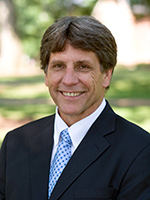
There is an opportunity cost associated with the decision to go to graduate school. The years spent in graduate school are lost years of employment. Most graduate students believe this is more than compensated by increased salary with a graduate degree and increased job satisfaction. Nonetheless, anything The Graduate School can do to reduce time-to-degree while preserving the quality of the degree is considered a win-win for the students and for the graduate program.
So how long does it take our students to earn their degrees and what are we doing to make a difference?
Most of our University’s master’s degree students graduate within three years if they attend full-time. Traditional research master’s degrees (M.A. and M.S.) are built on two-to-three-year curricula. The last several years have witnessed the emergence of master’s degree programs that are accelerated. For example, our Professional Science Master’s program degrees can be completed in 16 months of full-time, intensive work. In addition, master’s degree programs as short as 12 months are being designed with no loss of quality.
The median time-to-degree for our doctoral students is about 5.7 years. This compares favorably with our peers but many believe it is too long.
“It is important for our students to reduce their ‘opportunity costs’ and complete their graduate programs as quickly as possible. In addition, it is important for society to get these bright minds into the workforce as quickly as possible so they can apply their skills and knowledge to solving the world’s problems.”
For doctoral students, the Royster Society of Fellows, our premier fellowship program, provides full funding for five years with the first year and fifth year as non-service years. This latter point is important and a point of pride for this program. The non-service years provide our students with time to get their feet on the ground and take a full load of course work (first year) and then finish their dissertations, complete their job searches and graduate (fifth year). The Royster Society was created through the vision and generosity of Dr. and Mrs. Thomas S. Royster and has recruited more than 430 exceptional students to Carolina within a wide variety of academic areas.
We also provide dissertation fellowships that fund a final non-service year so students can complete their dissertations, focus on finding their next positions and graduate. For many students, the dissertation fellowship is the difference between a timely graduation and adding another year to complete the dissertation. In the last several years, we have been able to increase the number of dissertation completion fellowships we provide – 68 fellowships for the 2015-16 academic year. The Royster Society of Fellows also has dissertation fellowships, and 15 students are receiving this critical funding in 2015-16. This might be part of the reason for a decrease in the median time to degree in the humanities and fine arts from 7.7 years in 2008-09 to 6.9 years in 2014-15. A similar decrease in the social sciences has also been observed.
Finally, our Summer Research Fellowship program provides funding during the summer so students can focus exclusively on their dissertation research. This program was started in 2010 with a generous gift from Carolina alumnus Thomas F. Ferdinand and has been continued by matching gifts from donors with funding from The Graduate School to create several dozen summer fellowships each year. This may also have contributed to the reduced time-to-degree we have observed, as many of these outstanding fellowship recipients are in fields in which – if not for these fellowships – they would need to interrupt their dissertation research to support themselves during the summer.
It is important for our students to reduce their “opportunity costs” and complete their graduate programs as quickly as possible. In addition, it is important for society to get these bright minds into the workforce as quickly as possible so they can apply their skills and knowledge to solving the world’s problems. Whether they assume positions as faculty who are teaching and doing research in our universities or work within nonprofits or industry, we want them to graduate in a timely manner. Fortunately, with the support of generous donors, The Graduate School is able to provide critical funding to help make this possible. We have many partners in student success.
